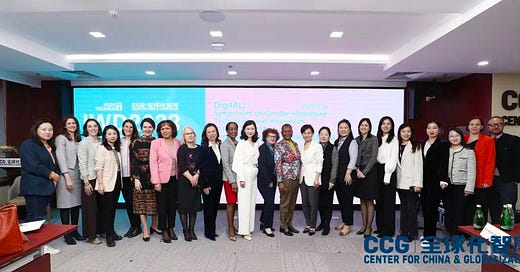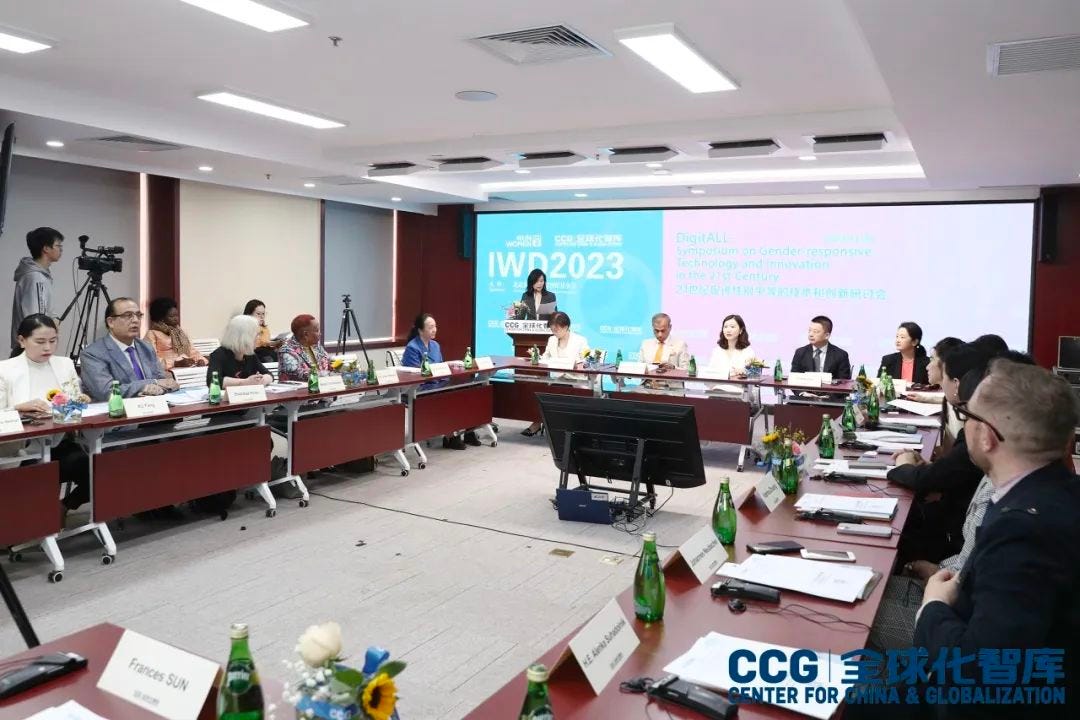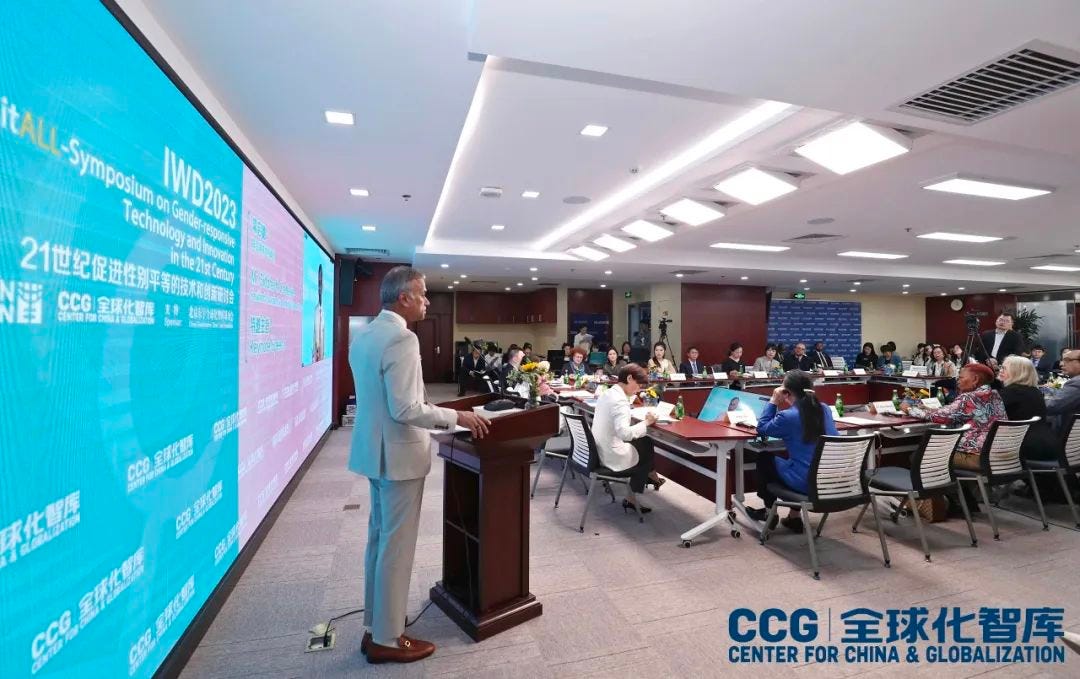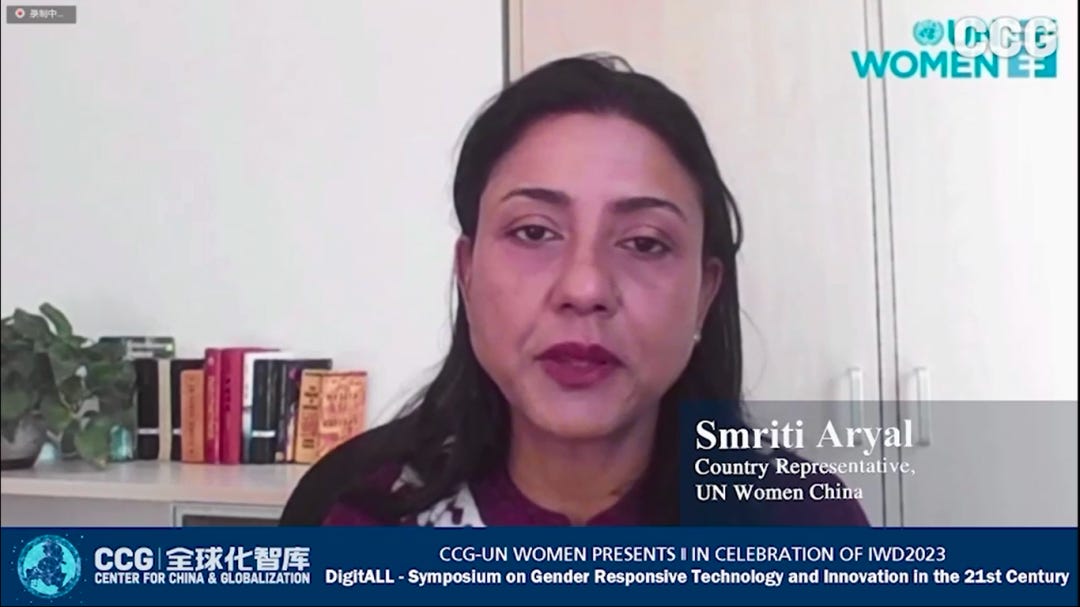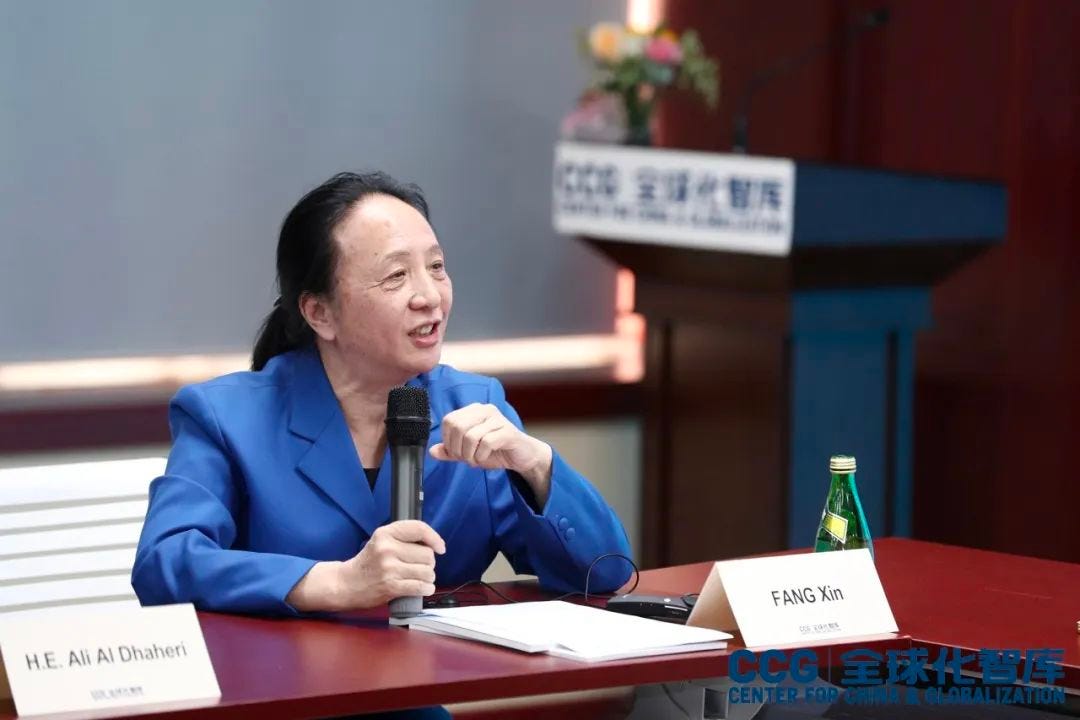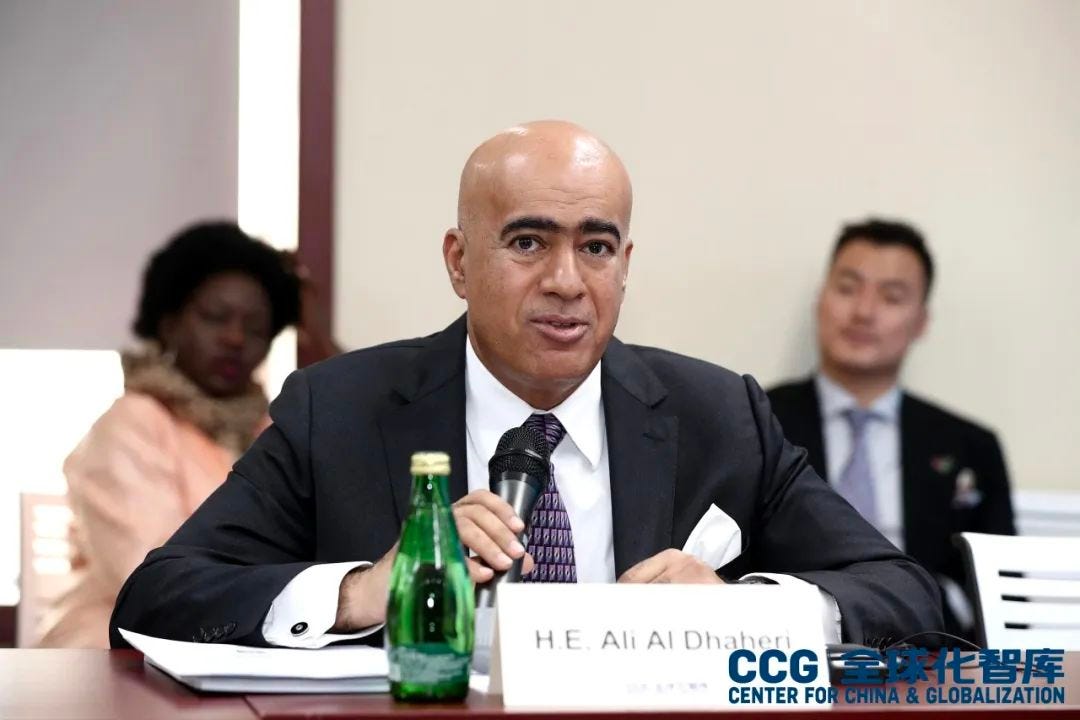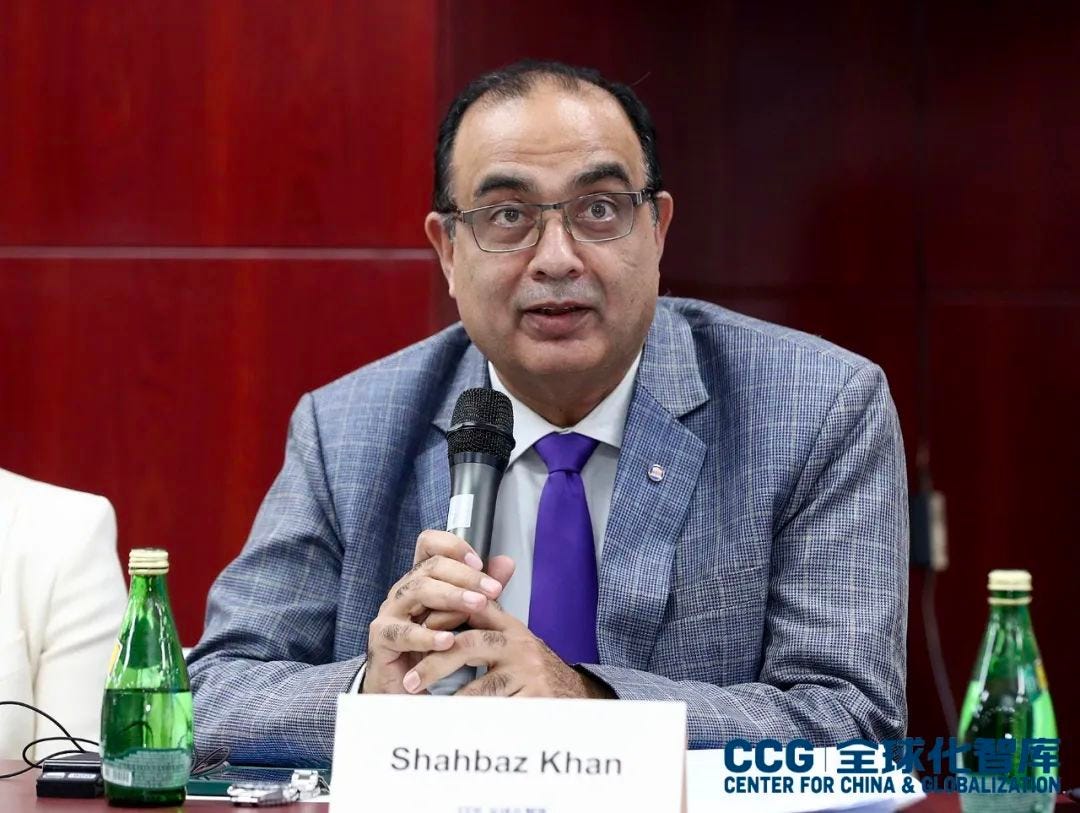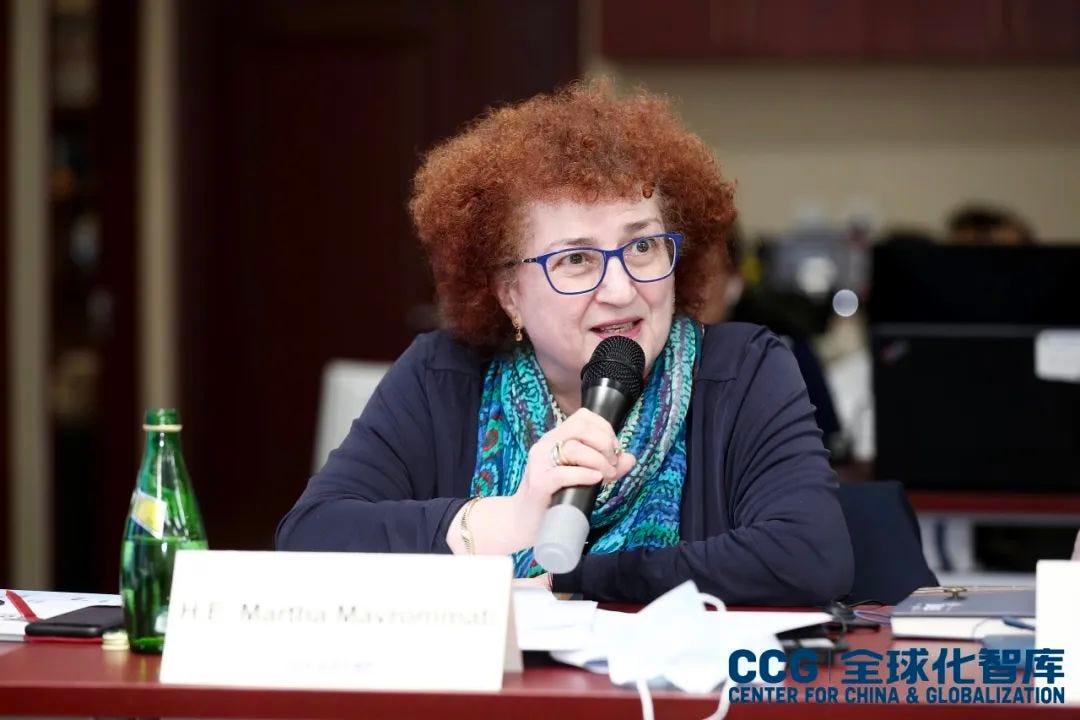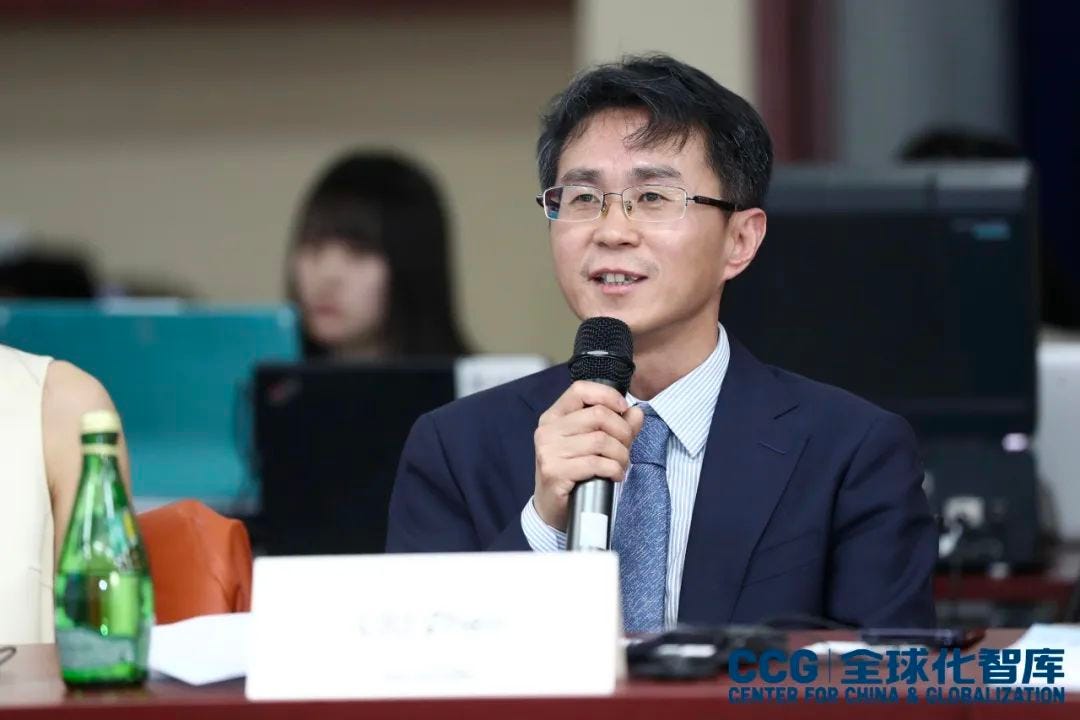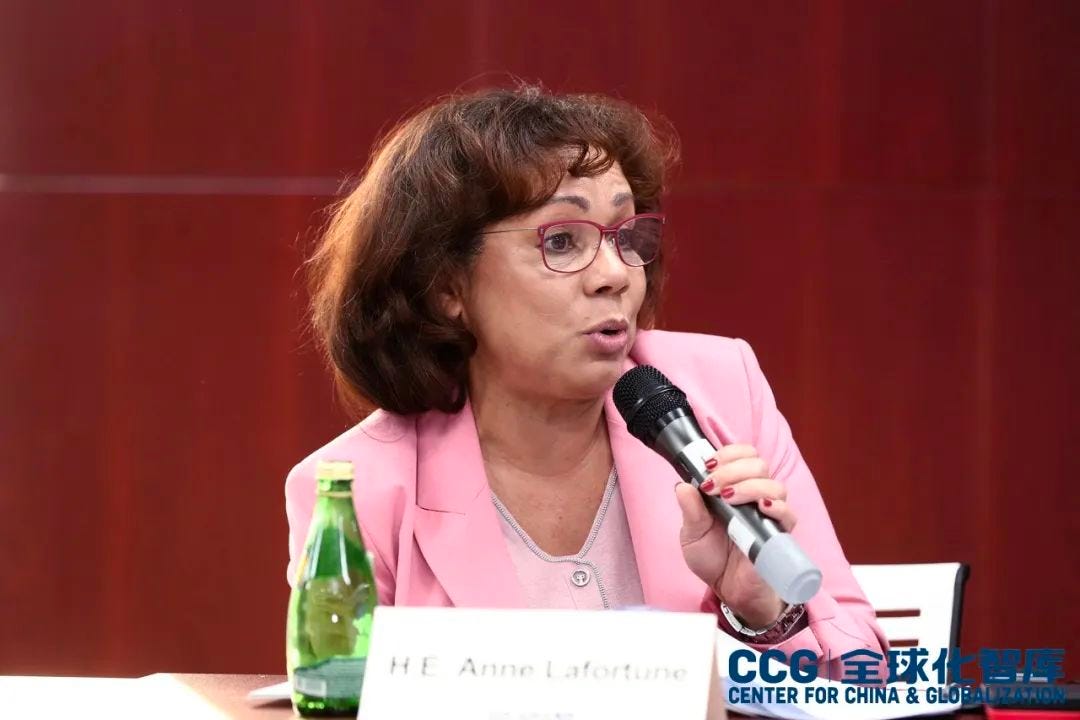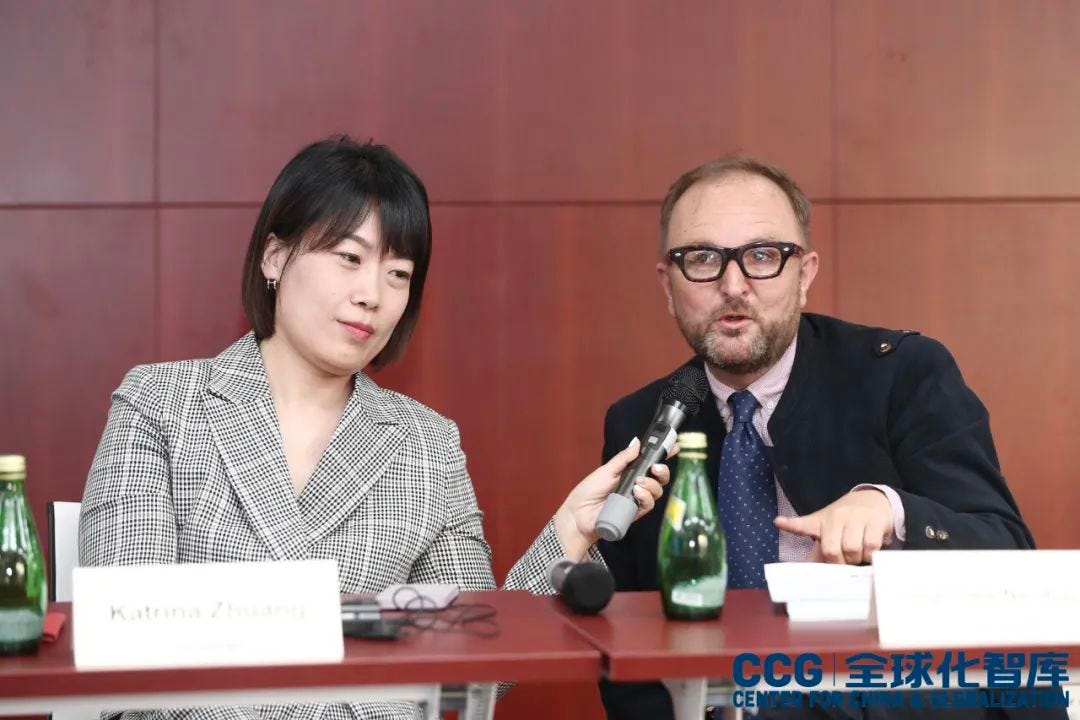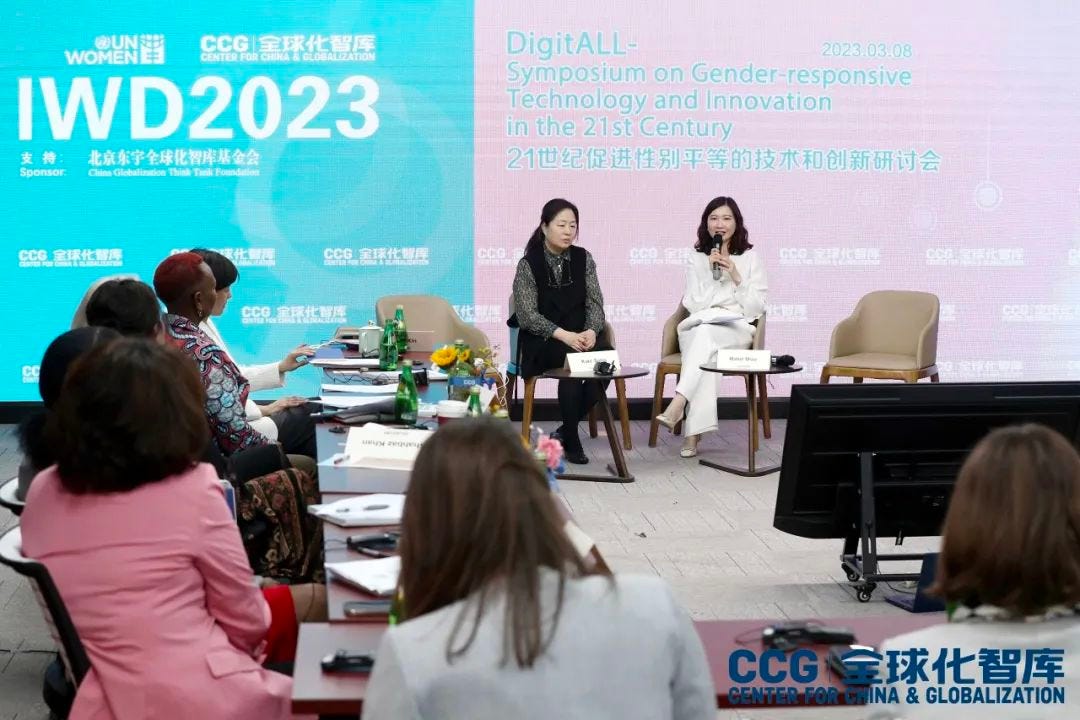Gender equality in Technology and Innovation: CCG marks International Women's Day with symposium
CCG, Chinese officials, UN representatives, and foreign diplomats address the challenges from the rapid development of technology and innovation to gender equality.
On March 8, 2023, International Women's Day, the Center for China and Globalization (CCG) and the UN Women China hosted "DigitALL - Symposium on Gender-Responsive Technology and Innovation in the 21st Century."
The event aims to address the challenges brought about by the rapid development of technology and innovation to gender equality, identify solutions to promote gender equality in innovation, technology, and digital education, and accelerate the implementation of the Beijing Declaration and Platform for Action and realize the 2030 Agenda for Sustainable Development.
Participants include:
Chinese government officials from the Ministry of Education (MOE) and the Ministry of Industry and Information Technology (MIIT);
Representatives from the UN Women, the United Nations Development Programme (UNDP), the United Nations Educational, Scientific and Cultural Organization (UNESCO), the United Nations Children's Fund (UNICEF), and other UN entities in China;
Diplomats in Beijing, including those from the European Union (EU) Delegation, the Republic of Korea, the Republic of Uganda, the United Arab Emirates (UAE), Israel, Cyprus, Slovenia, the Bahamas, and Seychelles;
Experts and scholars from think tanks and academia, and representatives from the business community.
The participants shared their best practices on designing gender-responsive technology, developing and deploying gender-inclusive innovation and digital ecosystems, and exploring solutions for protecting women and empowering them economically in digitization and innovation.
CCG Secretary-General Mabel Lu MIAO presented the welcome speech, followed by a special opening address by Smriti Aryal, UN Women China Head of the Office. Keynote speeches were then given by Siddharth Chatterjee, Resident Coordinator of UN in China; Chen Dali, Deputy Director-General of the Department of International Cooperation and Exchange at China’s Ministry of Education; and Zhang Xiaoyan, Vice President of China Center for Information Industry Development, MIIT.
Mabel Lu MIAO expressed her gratitude to everyone who came to CCG on this special day for women and girls in China and around the world. She noted that the rapid development of scientific and technological innovation in the 21st century had brought unprecedented advancement in improving women and girls' social, economic, and political status. However, it has also raised the risk of exacerbating existing patterns of gender inequality. In light of this, CCG held this symposium to share best practices to narrow the gender digital divide and identify technological and innovative actions.
MIAO said CCG is willing to play an active role in promoting gender equality and collaborate with the United Nations, the business community, and other government institutions to accelerate the implementation of the Beijing Declaration and Platform for Action and realize the 2030 Agenda for Sustainable Development.
Smriti Aryal said that we live in a digital era where technological advancements bring unprecedented opportunities for growth and development but also pose challenges that could further deepen inequalities, including long-standing gender inequality. The UN Women has been working on related issues in China and globally. China's rapid progress in digitalization and green transformation provides great opportunities to ensure that women and girls participate equally in these transitions and benefit from them.
Siddharth Chatterjee said that the issue of gender equality should be about concrete actions, and we need to consider how to make things happen. He emphasized that we should fully recognize women's contributions to the digital world and digital age, ensure that women and girls can enjoy the opportunities brought about by digital and scientific-technological development, and share the opportunities brought by modernization. Since the digital divide has become a new symbol of gender inequality, governments, business communities, non-governmental organizations, and various agencies must incorporate gender factors into digital planning and policies. He called for more efforts to understand the significant impact of the digital revolution on women and strive to reduce gender inequality and digital divide.
Chen Dali, Deputy Director-General of the Department of International Cooperation and Exchange at China’s Ministry of Education, said that women are the creators of human civilization and the driving force behind social progress. The Chinese government has always placed education in a prioritized position and sees it as a priority area for promoting women's development. Since adopting the reform and opening-up policy, especially after the 18th National Congress of the Communist Party of China in 2012, education for girls and women has continued to improve. Much progress has been made in women's access to education, employment, and study abroad. In the future, the Chinese government will fully leverage education's important role in promoting gender equality and technological innovation, expand international exchanges and cooperation in education, and provide more platforms for women. At the same time, China will actively fulfill its international responsibilities, enhance gender equality worldwide, ensure women and girls' right to education, and promote the implementation of the Beijing Declaration and Platform for Action adopted at the Fourth World Conference on Women.
Zhang Xiaoyan, Vice President of China Center for Information Industry Development of MIIT, stated that there have always been several uncertainties regarding gender equality in digital society. Firstly, the problem of gender imbalance still exists and may worsen in digital education. Therefore, we need to promote gender equality in education and eliminate discrimination against women and girls. Secondly, there are not enough women in leadership positions. We need to advocate and encourage women in the workplace to make more progress in their work. At the same time, we should note that there has always been a stereotype that women are not good at technology development in society, and we must strive to prevent such discrimination. In addition, women are more vulnerable to various risks in the digital age, and we should also take measures to tackle corresponding risks and challenges.
The symposium included two panels. The first was titled "Gender-responsive technology design, development and deployment & gender-inclusive innovation and digital ecosystems." Guest speakers included Fang Xin, Academician of the World Academy of Sciences for the Advancement of Science in Developing Countries, H.E. Ali Obaid AI Dhaheri, Ambassador of the UAE to China, H.E. Oliver Wonekha, Ambassador of Uganda to China, Beate Trankmann, Resident Representative from the UNDP China, Shahbaz Khan, Director and Representative of UNESCO Office Beijing, Xu Fang, Managing Partner of Galaxy Ventures. CCG Secretary-General Mabel Miao chaired this panel.
Fang Xin analyzed the impact and causes of gender equality in information technology and biotechnology. She proposed policy resolutions to resolve the stereotypes created by social bias.
H.E. Ali Obaid Al Dhaheri reviewed the contribution of UAE women to the country over the past decade, proposing a work plan to empower women in technology and innovation research and development from a national mechanism perspective and policy level.
Shahbaz Khan introduced the efforts made by UNESCO in promoting gender equality and women's empowerment, especially in China's practical measures to enhance women's digital literacy.
H.E. Oliver Wonekha said that the priority is to cultivate women's and girls' digital competencies, particularly in the least developed countries (LDCs), and to strengthen the legal framework to help women break through the barriers of patriarchal societies.
Beate Trankmann believes that women's participation and representation in the technology field are insufficient and suggests encouraging women's participation in sustainable innovation fields, issuing relevant policies, and changing restrictive and biased promotion.
Xu Fang shared from the perspective of a female investment entrepreneur that women face changes in supply-side, asset-side, and technology-level promotion in the digital era, pointing out that improvement requires a deep integration of data technology and industry and the combination of software and hardware.
The second panel focused on "Protection and economic empowerment of women and girls in the context of digitalization and innovation." Participants included: H.E. Martha Mavrommati, Ambassador of Cyprus to China; Liu Zhen, Vice President of Kuaishou Technology; Dora Giusti, Chief of Child Protection at UNICEF China; Kathy Gong, CEO and Co-Founder of WafaGames, and Zhao Xin, Board Member and CEO of Business in Arctic Green Energy China Office.
CCG Secretary-General Mabel Miao and Partnership Specialist for UN Women China Yang Ruikan hosted this discussion.
H. E. Martha Mavrommati introduced the development of gender equality in Cyprus, using her own experience and examples of women around her to propose developing education and raising awareness on gender equality.
Liu Zhen shared Kuaishou's efforts for gender equality at the e-commerce level. He believes that women are crucial to the digital economy and that it is necessary to accelerate the design and development of data-driven products and services that promote gender equality.
Dora Giusti focused on bridging the digital divide in South Asia and tapping into women's potential. She highlighted that technological development might aggravate gender-based violence, and measures should be taken to protect girls from violence.
Zhao Xin said that in the context of global digital transformation, the private sector should also take action and attach importance to women's economic empowerment while promoting the green transformation of energy.
Kathy Gong shared the development history of her game software development company and pointed out the issue of gender inclusiveness in the gaming industry and technology and innovation ecosystems.
H. E. Paulette Anne Bethal, Ambassador of the Bahamas to China
H.E. Anne Lafortune, Ambassador of Seychelles to China
Johannes Neubacher, Vice President of WWD Greater China
Yang Ruikan, Partnership Specialist for UN Women China, moderated the discussion.
Ambassador of the Bahamas to China, H.E. Paulette Anne Bethel, Ambassador of Seychelles to China, H.E. Anne Lafortune, Katrina Zhuang, General Manager of Arrail Plus, and Johannes Neubacher, Vice President of WWD Greater China, joined the discussion.
The symposium also set up a special dialogue, with the theme "Making Sure Women Have a Seat at that Table: Strengthening the voice of women on technology and innovation decisions that will define the 21st century".
Arancha González, Dean and Professor of the Paris School of International Affairs at Sciences Po, former Minister of Foreign Affairs of Spain, and former Cabinet Director for the Director-General of the World Trade Organization, sent a special message.
H.E. Alenka Suhadolnik, Ambassador of Slovenia to China, LYU Yue, Professor of International Trade at the University of International Business and Economics, and Karen Guo, Vice President of Public Affairs at Novelis China and Chair of the Business Sustainability Committee of AmCham China, participated in the session. Helene Juramy, Trade Officer at the EU Delegation to China, moderated this special dialogue.
Arancha González mentioned in her special message that “non-discrimination” should be a core principle in promoting digital equality, and more women role models should be established. She also highlighted the need to encourage the active participation of women in diplomacy, trade, and technology fields and support women entrepreneurs in the digital economy.
H.E. Alenka Suhadolnik shared the challenges she faced as a woman in her diplomatic career based on her own experience and introduced Slovenia's progress in supporting women in politics.
LYU Yue emphasized the importance of improving the status of women in academia and the crucial role of digital technology in women's participation in the electronic industry and the digital market economy.
Karen Guo said that equal opportunities are a major challenge women face in China. She analyzed the impact of the macroeconomic situation on women and called for increased solidarity among women.
Helene Juramy, Trade Officer at the EU Delegation to China, moderated the special dialogue.
In the end, Mabel Lu MIAO, Co-founder and Secretary-General of CCG, and Kate Sohn, Minister Counsellor of the Embassy of the Republic of Korea to China and Steering Group of Women in Trade Beijing, delivered concluding remarks with summaries of the event.
The CCG Foundation, Galaxy Venture, Arrail Plus, WWD China, and GIADA sponsored the event.
As a leading non-government think tank in China, CCG consistently emphasizes gender equality, technological innovation, and sustainable development issues.
On International Women's Day last year (March 8, 2022), CCG and UN Women China hosted "Gender equality today for a sustainable tomorrow: a symposium on biodiversity and climate change from a gender perspective." [in Chinese]

